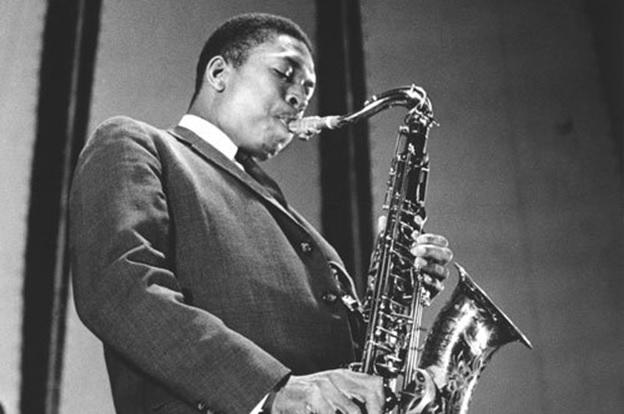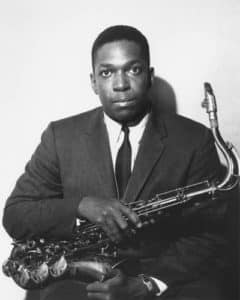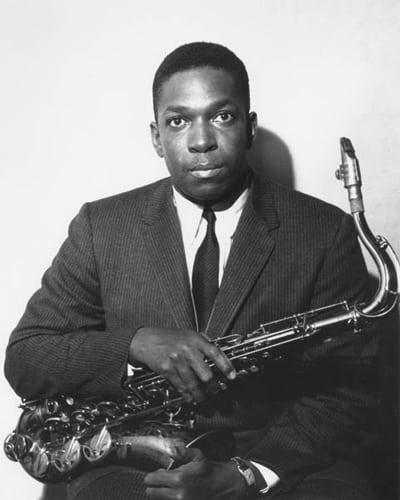A Musical Narration: “Psalm” from “A Love Supreme”
John Coltrane turned his handwritten poem “Psalm” into the final song on his “A Love Supreme” album. In this section of the album, Coltrane brings his poem that expresses his feelings towards/about God to life. He performs a “musical narration” in the liner notes, which are clear due to the structure of the piece.

Background
In 1964, John Coltrane recorded an important album called “A Love Supreme.” His music was an extension of his religious beliefs. Coltrane wrote the liner notes and a poem for this piece, which were moving and important. Moreover, this album relies less and less on planned musical routines. Though his style of music was mostly improvised, there is structure through his religious message. For example, longer constructions are portrayed throughout this piece.
Coltrane recreates his own progress in the four-part suite: “Acknowledgement,” “Resolution,” “Pursuance,” and “Psalm.” In “Acknowledgement, he first learned to acknowledge the divine. In “Resolution” and “Pursuance,” he resolved to pursue it. Lastly, in “Psalms,” he searched and eventually celebrated in song what he attained. In “Psalm,” he displayed a “musical narration” of the poem he wrote through liner notes. As a result, the album is intended to be a spiritual album. Moreover, Coltrane offers the craftsman’s profound thanks as he concedes to his ability and instrument as being held not by him but rather by a spiral higher force.
Elements of the Music in “Psalm”
The fourth part of the album,“Psalm,” is the most heartfelt and intense suite. Coltrane explained it in his own album notes. He writes, “The fourth and last part is a narration of the theme, ‘A Love Supreme,’ which is written in the context.” This is portrayed as Coltrane plays thoughtfully over a musically free foundation featuring droning bass and piano, and Elvin Jones on tympani. Though his playing implements a musical scale with five notes per octave, in contrast to the heptatonic scale, which includes the major scale and minor scale, in this section, he is not talking about the musical theme. Here, he implies the topic of the poem. In this suite, he recites the poem on his saxophone, one note for each syllable.
In other words, Coltrane does not actually speak the words of the phone. Instead, he “plays” the words of the poem on saxophone. Moreover, some scholars have suggested that this performance is a homage to the sermons of African-American preachers. His playing expresses the meaning of the words. For example, in the essay “A Love Supreme”—John Coltrane (1964) ” by Lewis Porter, Porter writes that Coltrane displays this when he “serenes on the word “beautiful,” shouting out “He always will be.” (Porter 2). Furthermore, each section of several lines has an arch shape—an ascending phrase, a recitation on one tone, and a descending phrase. The recitation tones ascend as the piece builds in intensity. Coltrane’s poem is punctuated with the frequently recurring words “Thank You God.” He plays these words as a minor third or fifth descending to the tonic, resembling formulas used by black preachers for such phrases as “Yes, He did” and “Oh, Lord.” Another example where his playing expresses the meaning of the words is when Coltrane’s solo in this section ends with the cry “Elation. Elegance. Exaltation. All from God. Thank you God. Amen.” Here, he clearly plays “Amen” on his sax. This adds a twist just on that last word. He likewise added overdubbing to make a greater, more sensational ending.
“A Love Supreme” is the conclusive assertion of the melodic and profound yearning of this calm, unassuming man. It is planned to be an otherworldly collection, extensively illustrative of an individual battle for virtue, and offers the craftsman’s profound thanks as he concedes to his ability and instrument as being held not by him but rather by a spiritual higher force. In the suite, “Psalm,” this is portrayed through his musical narration of his poem.
Works Cited
Porter, Lewis. Loc.Gov, 2015, https://www.loc.gov/static/programs/national-recording-preservation-board/documents/Coltrane.pdf.
More by the Author

The Two Waves of Detroit Techno Music: Techno and Rave!
The Two Waves of Detroit Techno Music: Techno and Rave! Techno, house, and rave (electro) are the primary forms of electronic music in Detroit. Though
Women of the Blues: Bessie Smith
Women of the Blues: Bessie Smith The Blues genre did not only include black men. Black Women significantly contributed to the sound of the blues.
A Century of Gospel Music
A Century of Gospel Music Gospel music is the form of African American religious music. It is a willful expression of the desire of African
Ciara
CIARA Who is Ciara? Ciara Princess Wilson (aka Ciara) was born on October 25, 1985 in Fort Hood, TX. Ciara does it all. She is

A Musical Narration: “Psalm” from “A Love Supreme”
A Musical Narration: “Psalm” from “A Love Supreme” John Coltrane turned his handwritten poem “Psalm” into the final song on his “A Love Supreme” album.


